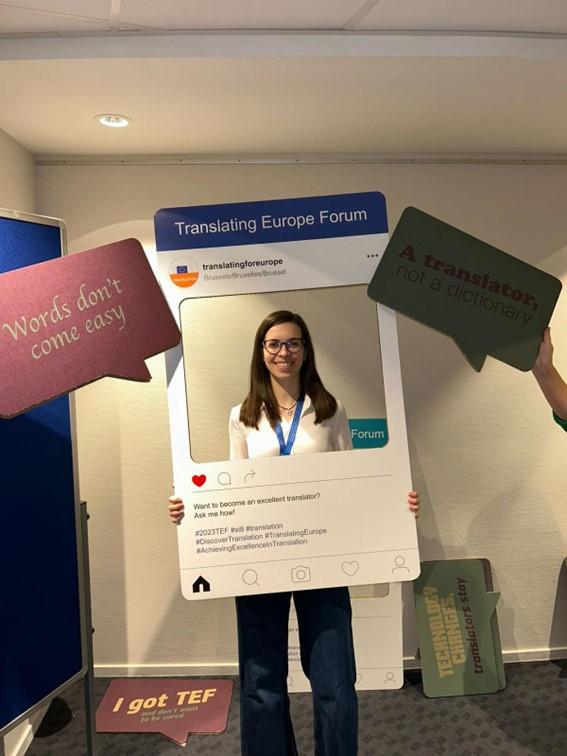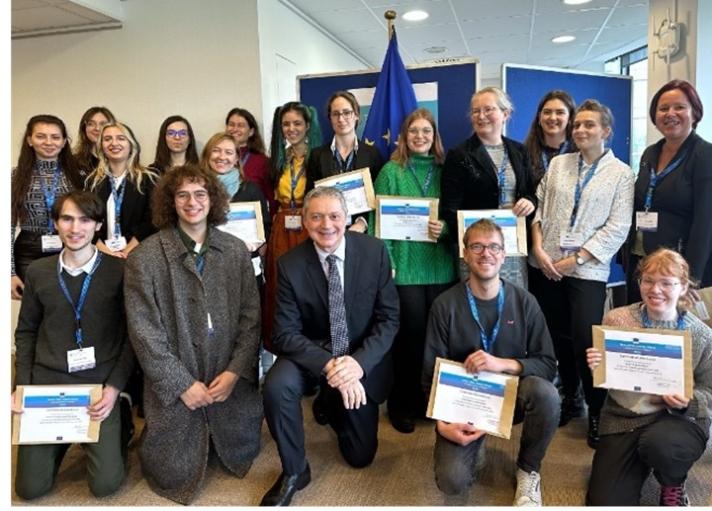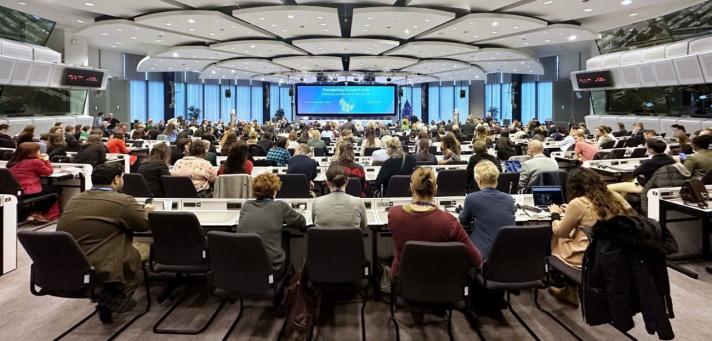
From 8 to 10 November 2023, I had the honour and pleasure of attending the Translating Europe Forum 2023, which took place at the European Commission’s Charlemagne Building in Brussels. The title of the forum was “Achieving Excellence in Translation”, and it addressed, from a practical approach, the current situation relating to Artificial Intelligence, among other topics that are of immediate concern within the field of translation. It offered participants optimistic and valuable insights on the potential uses of AI technologies within the ever-evolving field of language translation.
To be fair, the days before taking the flight to Brussels, I was really doubtful about my contribution to this academic and professional meeting. Coming from a Degree in English Studies, I had only been inside the translation field for the first month of the master’s programme. As a result, I pictured myself as a complete newcomer surrounded by well-established experts from all over Europe.
Nevertheless, from the very moment of my first encounter with other participants, and throughout the remaining days, I felt a sense of connection and togetherness towards those hundreds of strangers. The Translating Europe Forum allowed me to experience first-hand how closeness and affinity can cut across political, language and generational borders in order to enable a community of professionals to share enlightening opinions and ideas. This meeting made me realise the devotion for languages that everyone in the profession shares, and it reaffirmed my own passion for the world of languages and translation.
Furthermore, I was pleasantly surprised to see so much representation from my home country in this European meeting. I was able to listen to Spanish panellists and attendees, and this circumstance helped me broaden my horizons in terms of the multiple roles that translation can play traversing the borders of territories and languages. Adding to my previous argument, I could perceive a common sense of identity among these Spanish citizens and scholars and also among other European intercultural professionals. From this multilingual perspective, the European Commission became, during these three days, a hospitable space where one could nurture the mind with thought-provoking presentations, engage in delightful conversations and networking breaks with colleagues, or even listen to an improvised guitar concert that stirred all those present. These instances prove once more the power of a common, shared purpose to build unity and to celebrate divergent backgrounds and the extraordinary value of translation in this endeavour.
Another highlight from this outstanding experience was the group meeting that the EMT students had with the Director-General for the Directorate-General for Translation, Christos Ellinides. He warmly welcomed us to the European Commission, and we were able to discuss with him the leading role that we can have as young professionals in order to make a difference in the labour market.
With regards to the topic of Artificial Intelligence that permeated the entire forum, I was quite absorbed by the generalised sense of concern towards what this technology has in store for our industry. I initially had only a very vague idea of the implications that AI technologies entail for the translation field, but during the sessions I became acutely aware of the many implications for the present and future that machine translation with Artificial Intelligence holds. However, I left the meeting with a very optimistic perspective, with more faith in the future of this profession with AI and with other forthcoming developments. I also felt reassured in my decision to enter this career path.
In general terms, I found the panels very enlightening and informative. For instance, many lecturers emphasised the importance of acting collaboratively and helping each other when facing the adaptation to new developments and to the evolution of the tasks required of translators. Specifically, I appreciated discussions on the work of institutions, agencies and associations to enable less secure colleagues to navigate more confidently their first steps into the job market. These stakeholders also help beginners reinforce their competences in aspects such as reaching fair negotiations and advantageous agreements for all parts involved or gaining the trust of clients to create a favourable impression in the market. Moreover, information was given on the fact that associations can update their members on current company-specific programmes which will enable newcomers to initiate their path in the translation business.
Some lecturers and roundtable participants stressed that the future of our profession might be increasingly directed towards the tasks of post-editing and revision of machine-translated texts. In this sense, they did not want to dishearten us, but to underline the growing competences which technology is taking over and to inspire us to adjust to new realities in which the human force is most highly treasured. During a panel about job excellence, it was quite rightly said that “the only constant in our world is change” and it was stressed that, as change is accelerating, we need to be very flexible professionals. Another lecturer demonstrated this evolution in the field of subtitling with a practical example that attracted my attention. The presenter expressed his conviction that the future will encourage more subjective subtitling of audiovisual content to better suit the needs of users with divergent accesses to communication. The type of descriptive practices he referred to allows translators to develop deeper creative capabilities and, thus, allow them to convey better one particular audiovisual message to individuals with different languages and cultures or even with different abilities.
Among all the extremely interesting interventions, I found a commentary by Gökhan Fırat very stimulating because he displayed a down-to-earth attitude towards AI. He described the rise of this technological development as just a manifestation of the evolution of translation in our digital era. But, more importantly, he called attention to the bigger picture and to other factors which always endure and affect our lives, such as capitalism, colonialism, patriarchy, and the search for private profit in general. We cannot compete with a machine that is more cost-effective and that processes a higher volume of words. He stressed that, as technology is here to stay, instead of merely demonising it, we should not lose sight of the new possibilities that this new environment offers to continue to thrive as professionals at the service of communication.
I learned many aspects about what to expect from the job market from all the panels, but it was the Keynote lectures that were the most captivating for me.
Katja Schipperheijn argued that, as a result of the rapidly-changing technological developments of the last decades, we have to look at the world through a different lens. She emphasised the necessity to become more human in this world that is becoming more digital, and I think that she developed this argument wonderfully. In her opinion, we are too focused on the tasks and functions in which AI will replace us, but we should put our efforts into learning to co-work with these new tools and into enhancing our human value. Schipperheijn especially encouraged the audience to think back to how we experienced the world when we were children, because that is where the essence of our nature was founded and developed. From this bright point of view, she suggested that we can cherish and improve qualities that distinguish us as humans and place us above and beyond the capabilities of any AI: imagination, curiosity, optimism, openness, critical thinking, resilience, empathy and consilience.
Ashkan Fardost astonished the audience from the very title of his speech: “Everyone has Misunderstood AI.” He also made us question our reality, and the way in which we approach it, comparing it to those of previous historical eras. He made us consider Artificial Intelligence as an extension of our human body, one completely consistent with the digital turn that our natural evolution has experienced. From his perspective, the role of the translator should be linked to an endless process of updating and improvement. Nevertheless, Fardost also discussed the limitations of technological tools because they function through previous input and the mathematization of the most likely choices in a particular context. As he suggested, fortunately for us, even in a digital tribal society, there are certain aspects that are impossible to be mathematized and, thus, computed by machines: cultural traditions that depend on emotions; necessary ingredients to make a new Mozart; or linguistic subtleties involving one grammatical connotation and a different pragmatic meaning. These instances are rooted in emotional brains that machines lack; and this is where the role of human professionals remains crucial. Therefore, it follows from this argument that we need to work on our human side more than ever, as well as to make the best use of the current and future extensions of our body that may be developed.
In addition to the magnificent seminars, I would also like to commend the exceptional work carried out by DG Translation in the complex organization of this event, and by the European Commission in general for enabling its polished development. They made themselves unfailingly available to the participants throughout the whole experience, and made all arrangements with respect to the journey, accommodation and stay. In the same way, I would like to show my gratitude to the EMT network for including us, students from masters within the network, in encounters such as the TEF. Thanks to their relentless work in smoothing the path leading from translation training programs to the job world, young people like me can benefit from these transformative opportunities, both academically and professionally. I would also like to thank the University of Salamanca in general, and the governing body of the Master in Translation and Intercultural Mediation in particular, for having trusted me to represent this academic institution in such a relevant event in the European translation field.
In short, it has been an extremely enlightening experience, thanks to which I have met wonderful colleagues and influential voices from the translation field. I would definitely recommend that future colleagues attend this annual event in person or online in the coming years.
Details
- Publication date
- 20 March 2024
- Author
- Directorate-General for Translation
- Language
- English
- EMT Category
- Professional experience/employability
- Translation competences


